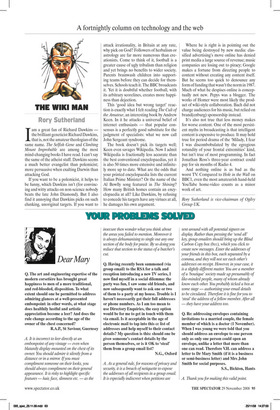A fortnightly column on technology and the web
Rory Sutherland
Iam a great fan of Richard Dawkins the brilliant geneticist Richard Dawkins, that is, not the amateur theologian of the same name. The Selfish Gene and Climbing Mount Improbable are among the most mind-changing books I have read. I can’t say the same of the atheist stuff. Dawkins seems a much better evangelist than polemicist; more persuasive when exalting Darwin than attacking God.
If you want to be a polemicist, it helps to be funny, which Dawkins isn’t (for convincing and witty attacks on non-science nobody beats the late John Diamond). But I also find it annoying that Dawkins picks on such clunking, unoriginal targets. If you want to attack irrationality, in Britain at any rate, why pick on God? Followers of herbalism or astrology are far more numerous than creationists. Come to think of it, football is a greater cause of ugly tribalism than religion and yet brings no benefits to wider society. Parents brainwash children into supporting teams before they can decide for themselves. Schools teach it. The BBC broadcasts it. Yet it is doubtful whether football, with its arbitrary scorelines, creates more happiness than dejection.
This ‘good idea but wrong target’ reaction is exactly what I felt reading The Cult of the Amateur, an interesting book by Andrew Keen. In it he attacks a universal belief of internet enthusiasts — that popular consensus is a perfectly good substitute for the judgment of specialists: what we now call John Sergeant syndrome.
The book doesn’t pick its targets well; Keen even savages Wikipedia. Now I admit Wikipedia is fractionally less accurate than the best conventional encyclopaedias, yet it is also 50 times more extensive and infinitely more up to date. What are the odds that your printed encyclopaedia lists the current Italian Prime Minister? Or the name of the Al Bowlly song featured in The Shining? How many British homes contain an encyclopaedia at all? Like Dawkins, by refusing to concede his targets have any virtues at all, he damages his own argument. Where he is right is in pointing out the value being destroyed by new media: classified advertising’s move online has denied print media a large source of revenue; music companies are losing out to piracy; Google makes a fortune from directing people to content without creating any content itself. But he seems too quick to denounce any form of funding that wasn’t the norm in 1987. Much of what he despises online is conceptually not new. Pepys was a blogger. The works of Homer were most likely the product of wiki-style collaboration. Bach did not charge audiences for his music, but relied on brand(enburg) sponsorship instead.
It’s also not true that less money makes for worse content. One of the most persistent myths in broadcasting is that intelligent content is expensive to produce. It may hold true for period drama of the ‘Milady, I fear I was discombobulated by the egregious rotundity of your frontal extremities’ kind, but isn’t true of most programming. In fact Jonathan Ross’s three-year contract could pay for six months of Radio 4.
And nothing online is as bad as the worst TV. Compared to Hole in the Wall on BBC1, even the most amateurish hand-held YouTube home-video counts as a minor work of art.
Rory Sutherland is vice-chairman of Ogilvy Group UK.


































































































 Previous page
Previous page